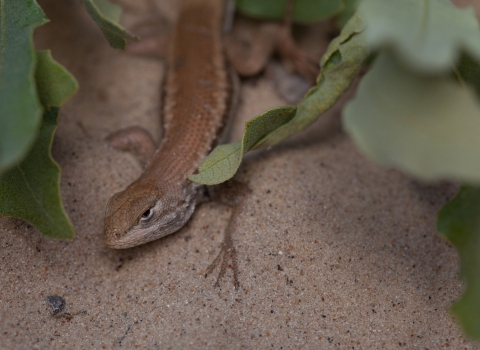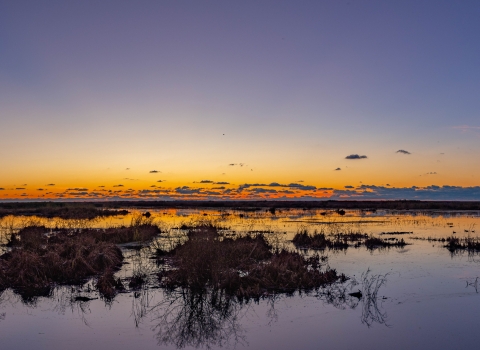Press Release
U.S. Fish and Wildlife Service Proposes Updating List of Bird Species Protected by the Migratory Bird Treaty Act
The U.S. Fish and Wildlife Service proposes to amend the list of migratory birds protected by the Migratory Bird Treaty Act (MBTA). If approved, the proposal would represent the first amendments to the list in more than 20 years.
"The Migratory Bird Treaty Act is a landmark in wildlife conservation, protecting hundreds of species of migratory birds that fill the skies of North America," said Service Director H. Dale Hall. "An accurate and updated list of protected species will help State and Federal wildlife and law enforcement agencies protect and conserve our migratory bird resources, while facilitating important scientific, educational and cultural activities."
The Service invites public comment on the revised list, which was published in the August 24, 2006 Federal Register and proposes adding 152 species and removing 12 from the list of protected migratory birds. The net increase of 140 species will bring the total number of species protected by the MBTA to 972.
The revised list of species protected by the MBTA will guide the Service in issuing Federal permits to assist in migratory bird conservation and to authorize otherwise prohibited activities, including those related to scientific research, Native American cultural and religious ceremonies, and injured bird rehabilitation.
The Migratory Bird Treaty Act is one of the nation's earliest conservation laws, enacted in 1918 to implement a series of treaties for the protection of shared migratory bird resources signed by the United States with Canada, Japan, Mexico and Russia. The Act prohibits take of protected species, their nests and eggs except as authorized and permitted by the Service. Some of the treaties list groups of birds that are to be protected. This list shows individual species that fall into these groups and are therefore protected by the MBTA.
The 152 species proposed for addition include two covered by Japanese and Russian treaties that were mistakenly omitted from the 1985 list; 26 species known to occur in the United States accidentally or occasionally prior to April 1985 but not included in the 1985 list; 60 species confirmed as occurring in the United States only since April 1985; 27 species that occur naturally in the United States only in the U.S. associated Pacific Islands; and 37 formerly considered subspecies of protected species (and only recently elevated to full species status).
The 12 species proposed to be removed from the list include 11 that are no longer recognized as occurring within the boundaries of the United States and one that is now treated as a subspecies of a still-protected species.
In addition, changes in the common or scientific names of 112 species are proposed to bring the list into conformity with the American Ornithologists? Union's Check-list of North American Birds, the recognized scientific authority on the subject.
The proposed rule also reaffirms a prior Service determination that the mute swan is not protected under the MBTA because it is non-native and human-introduced, in accordance with the Migratory Bird Treaty Reform Act of 2004.
The Act provides that it is unlawful to pursue, hunt, take, capture, kill; attempt to take, capture or kill; possess, offer for sale or sell, barter, purchase, deliver or cause to be shipped, exported, imported, transported, carried or received any migratory bird, part, nest, egg or product, manufactured or not. Violators of the Act may receive a maximum $250,000 fine and two years in prison.
To view the proposed rule, please visit http://migratorybirds.fws.gov. Public comments will be accepted through October 23, 2006. Comments will be accepted by postal mail sent to Chief, Division of Migratory Bird Management, U.S. Fish and Wildlife Service, 4401 North Fairfax Drive, Mail Stop 4107, Arlington, VA 22203; by hand-delivery to U.S. Fish and Wildlife Service, Division of Migratory Bird Management, 4501 North Fairfax Drive, Room 4000, Arlington, VA 22203; by fax to (703) 358-2272.
"The Migratory Bird Treaty Act is a landmark in wildlife conservation, protecting hundreds of species of migratory birds that fill the skies of North America," said Service Director H. Dale Hall. "An accurate and updated list of protected species will help State and Federal wildlife and law enforcement agencies protect and conserve our migratory bird resources, while facilitating important scientific, educational and cultural activities."
The Service invites public comment on the revised list, which was published in the August 24, 2006 Federal Register and proposes adding 152 species and removing 12 from the list of protected migratory birds. The net increase of 140 species will bring the total number of species protected by the MBTA to 972.
The revised list of species protected by the MBTA will guide the Service in issuing Federal permits to assist in migratory bird conservation and to authorize otherwise prohibited activities, including those related to scientific research, Native American cultural and religious ceremonies, and injured bird rehabilitation.
The Migratory Bird Treaty Act is one of the nation's earliest conservation laws, enacted in 1918 to implement a series of treaties for the protection of shared migratory bird resources signed by the United States with Canada, Japan, Mexico and Russia. The Act prohibits take of protected species, their nests and eggs except as authorized and permitted by the Service. Some of the treaties list groups of birds that are to be protected. This list shows individual species that fall into these groups and are therefore protected by the MBTA.
The 152 species proposed for addition include two covered by Japanese and Russian treaties that were mistakenly omitted from the 1985 list; 26 species known to occur in the United States accidentally or occasionally prior to April 1985 but not included in the 1985 list; 60 species confirmed as occurring in the United States only since April 1985; 27 species that occur naturally in the United States only in the U.S. associated Pacific Islands; and 37 formerly considered subspecies of protected species (and only recently elevated to full species status).
The 12 species proposed to be removed from the list include 11 that are no longer recognized as occurring within the boundaries of the United States and one that is now treated as a subspecies of a still-protected species.
In addition, changes in the common or scientific names of 112 species are proposed to bring the list into conformity with the American Ornithologists? Union's Check-list of North American Birds, the recognized scientific authority on the subject.
The proposed rule also reaffirms a prior Service determination that the mute swan is not protected under the MBTA because it is non-native and human-introduced, in accordance with the Migratory Bird Treaty Reform Act of 2004.
The Act provides that it is unlawful to pursue, hunt, take, capture, kill; attempt to take, capture or kill; possess, offer for sale or sell, barter, purchase, deliver or cause to be shipped, exported, imported, transported, carried or received any migratory bird, part, nest, egg or product, manufactured or not. Violators of the Act may receive a maximum $250,000 fine and two years in prison.
To view the proposed rule, please visit http://migratorybirds.fws.gov. Public comments will be accepted through October 23, 2006. Comments will be accepted by postal mail sent to Chief, Division of Migratory Bird Management, U.S. Fish and Wildlife Service, 4401 North Fairfax Drive, Mail Stop 4107, Arlington, VA 22203; by hand-delivery to U.S. Fish and Wildlife Service, Division of Migratory Bird Management, 4501 North Fairfax Drive, Room 4000, Arlington, VA 22203; by fax to (703) 358-2272.


